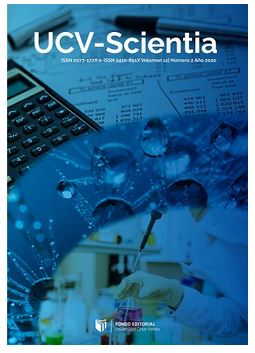Use of active methodologies for the development of critical thinking
DOI:
https://doi.org/10.18050/RevUcv-Scientia.v13n2a7Keywords:
critical thinking, active methodologies, teaching-learning, educational qualityAbstract
The objective of this bibliographic research was to analyze research results on the use of active methodologies and the development of critical thinking in students, based on scientific production published in the databases of
Scopus, Web of Science, Scielo and Latindex in the period 2016 -2021. To show that the use of these methodologies favors the development of critical thinking in students. The methodology used was the bibliographic review taking into consideration the objective, sample size, methodology and the results that show the relationship between the use of methodologies and the development of critical thinking in students of any level. It was concluded that scientific production regarding the use of active methodologies and their relationship with critical thinking has shown that there is a direct relationship, which implies that teachers should be trained in this methodology to ensure its use and proper application.
References
Alsarayreh, S. R. (2021). Teaching Developing critical thinking skills towards biology course using two active learning strategies. Cypriot Journal of Educational Science. 16 (1). 221-237 Doi: https://doi.org/10.18844/cjes.v16i1.5521
Amrullah, K., & Suwarjo, S. (2018). The effectiveness of the cooperative problem-based learning in improving the elementary school students’ critical thinking skills and interpersonal intelligence. Jurnal Prima Edukasia, 6 (1), 66-77. Doi: http://dx.doi.org/10.21831/jpe.v6i1.11253
Aránguiz, P., Palau-Salvador, G. Belda, A., & Peris, J. (2020). Critical Thinking using Project based learning: the case of the agroecological market at the “Universitat Politécnica de València”. Sustainability, 12 (9), 1-23. Doi: https://doi.org/10.3390/su12093553
Bernal, M., Gómez, M., & Iodice, R. (2019). Interacción conceptual entre el pensamiento crítico y metacognición. Revista Latinoamericana de Estudios Educativos, 15 (1), 193-217. http://latinoamericana.ucaldas.edu.co/downloads/Latinoamericana15(1)_11.pdf
Cangalaya, L. (2020). Habilidades del pensamiento crítico en estudiantes universitarios a través de la investigación. Desde el Sur, 12 (1), 141-153. Doi: 10.21142/DES-1201-2020-0009
Canese, M. (2020). Percepción del desarrollo de habilidades del pensamiento crítico en la Universidad Nacional de Asunción, Paraguay. Perfiles Educativos, 42 (169), 21-35. Doi: https://doi.org/10.22201/iisue.24486167e.2020.169.59295
Dennis Chun-Lok Fung, Helen To & Kit Leung (2016). The influence of collaborative group work on students’ development of critical thinking: the teacher’s role in facilitating group discussions. Pedagogies: An International Journal, 11 (2), 146-166, Doi: 10.1080/1554480X.2016.1159965
Deroncele, A., Nagamine, M., & Medina-Coronado, D. (2020). Desarrollo del pensamiento crítico. Maestro y Sociedad. Revista Electrónica para Maestros y profesores, 17 (3), 532-546.
Deroncele, A., Nagamine, M., & Medina, D. (2020). Bases epistemológicas y metodológicas para el abordaje del pensamiento crítico en la educación peruana. Revista Inclusiones, 7, 68-87. https://revistainclusiones.org/index.php/inclu/article/view/302
Erdogan, F. (2019). Effect of Cooperative Learning supported by reflective thinking activities on students’ critical thinking skills. Eurasian Journal of Educational Research, 80, 89-112. file:///C:/Users/ROSA%20QUISPE%20LLAMOCA/Dropbox/My%20PC%20(RQL)/Desktop/USB/semestre%202021-2/amiga%20de%20Karina/tammetin.pdf
Fajari., Sarwanto., & Chumdari. (2020). Influence of PBL-based multimedia and learning motivation on students’ critical thinking skills in elementary schools. International Conference on Science Education and Technology, 1511, 1-9. Doi:10.1088/1742-6596/1511/1/012012
Gomez, E., Isase, V., Poma, M., & Menacho, A. (2020). Aprendizaje colaborativo virtual en el pensamiento crítico en los estudiantes del 3er grado primaria, 2020. Revista Internacional Multidisciplinaria, 1, 346-358. https://es.unesco.org/news/educacion-peruana-cual-es-rumbo
Hernández, T. (2019). El aprendizaje basado en el pensamiento crítico en niños de 10 a 12años http://www.conisen.mx/memorias2019/memorias/2/P290.pdf
Jiménez, M., & Riquelme, A., & Londoño, D. (2020). Literacidad como promoción del pensamiento crítico en la Primera infancia. Educere, 24 (77),117-134 https://www.redalyc.org/articulo.oa?id=35663240011
Lambraño, S., & Robles, J. (2019). Aprendizaje por proyectos y los textos pretextos como estrategia metodológica para el desarrollo del pensamiento crítico y su incidencia en el rendimiento a académico. Espacios, 40 (39), 20-30. https://www.revistaespacios.com/a19v40n39/a19v40n39p20.pdf
Maturana, G., & Lombo, M. (2020). Inteligencia naturalista: efectos sobre el pensamiento crítico y las necesidades de cognición. Praxis & Saber, 11 (25), 177 - 204. Doi: https://doi.org/10.19053/22160159.v11.n25.2020.9094
Medina, D. & Nagamine, M. (2019). Estrategias de aprendizaje autónomo en la comprensión lectora de estudiantes de secundaria. Propósitos y Representaciones, 7 (2). 134–159. Doi: http://dx.doi.org/10.20511/pyr2019.v7n2.276
Meneses, J., Osorio,K., & Rubio, A. (2018). La comprensión de textos argumentativos como estrategia para el aprendizaje significativo y el desarrollo del pensamiento crítico. Actualidades Pedagógicas, (72), 29-47. Doi: https://doi.org/10.19052/ap.4336
Moreno, A., & Ramos, D. (2018). Lectura en el aula: una experiencia a partir de la pregunta. Revista Praxis Pedagógica 18 (23), 82-102. Doi:1026620/uniminuto.praxis.18.23.2018.82-102
Nomen, J. (2019). La escuela, ¿Un receptáculo del pensamiento crítico? Folia Humanística, (11), 29-43. Doi: http://dox.doi.org/10.30860/0048
Núñez, L., Gallardo, D., Aliaga, A. & Díaz, J. (2020). Estrategias didácticas en el desarrollo del pensamiento crítico en estudiantes de educación básica. Revista Eleuthera, 22 (2), 31-50. Doi: 10.17151/eleu.2020.22.2.3.
Ortega, V., & Gil, C. (2020). La evaluación formativa como elemento para visibilizar el desarrollo de competencias en cien¬cia y tecnología y pensamiento crítico. Publicaciones, 50 (1), 275–291. Doi:10.30827/publicaciones. v50i1.15977
Ossa, C., Lepe, N., Díaz, A., Merino, J., & Larraín, A. (2018). Programas de pensamiento crítico en la formación de docentes Iberoamericanos. Profesorado. Revista de Currículum y Formación de Profesorado, 4 (22), 443-462. Doi:10.30827/profesorado. v22i4.8432
Salazar, D., & Cabrera, X. (2019). Estrategia didáctica para fortalecer el pensamiento crítico en estudiantes de tercer grado de primaria en institución educativa de Chiclayo. Revista Científica Institucional Tzhoecoen, 12 (1), 1-9. Doi: https://doi.org/10.26495/tzh.v12i1.1240
Sein-Echaluce L., M. L., Fidalgo B., Á., & García P., F. (2015). Metodología de enseñanza inversa apoyada en b-learning y gestión del conocimiento Flip Teaching Methodololgy supported on b-learning and knowledge management. Actas del III Congreso Internacional sobre Aprendizaje, Innovación y Competitividad. CINAIC (pp. 464–468). Madrid: Fundación General de la Universidad Politécnica de Madrid. https://gredos.usal.es/jspui/bitstream/10366/126798/1/FlipTeaching.pdf
Siew, N., & Mapeala, R. (2016). The effects of problem based learning with thinking maps on fifth grades’ science critical thinking. Journal of Baltic Science Education, 15 (5), 602-616. Doi: 10.33225/jbse/16.15.602
Suhirman. Prayogi, S., & Asy‘ari, M. (2021). Problem-Based Learning with Character Emphasis and Naturalist Intelligence: Examining Students Critical Thinking and Curiosity. International Journal of Instruction, 14 (2), 217-232. Doi: https://doi.org/10.29333/iji.2021.14213a
Ulger, K. (2018). The Effect of Problem-Based Learning on the Creative Thinking and Critical Thinking Disposition of Students in Visual Arts Education. Interdisciplinary Journal of Problem-Based Learning, 12 (1). Doi: https://doi.org/10.7771/1541-5015.1649
UNESCO (28 de Julio, 2020). La UNESCO alerta sobre la necesidad de mayor presencia de conceptos como el conocimiento del mundo, el cambio climático y la equidad de género en los currículos de América Latina y el Caribe. https://es.unesco.org/news/estudio-regional-analisis-curricular-resultados
UNESCO (2017). Reporte educación y habilidades para el siglo XXI. Reunión Regional de Ministros de Educación de América Latina y e l Caribe, Buenos Aires, Argentina, 24 y 25 de enero 2017. shorturl.at/nsCLU
Ulger, K. (2018). The Effect of Problem-Based Learning on the Creative Thinking and Critical Thinking Disposition of Students in Visual Arts Education. Interdisciplinary Journal of Problem-Based Learning, 12 (1). Doi: https://doi.org/10.7771/1541-5015.1649
Urquidi-Martín, A.C., Tamarit-Aznar, C., & Sánchez-García, J. (2019). Determinants of the Effectiveness of Using Renewable Resource Management-Based Simulations in the Development of Critical Thinking: An Application of the Experiential Learning Theory. Sustainability 11. Doi:10.3390/su11195469
Urrutia, G., & Bonfill, X. (2010). Declaración PRISMA: una propuesta para mejorar la publicación de revisiones sistemáticas y metanálisis. Medicina Clínica, 135 (11), 507-511. Doi: 10.1016/j.medcli.2010.01.015
Yulian, R. (2021). The flipped classroom: Improving critical thinking for critical reading of EFL learners in higher education. Studies in English Language and Education, 8 (2), 508- 522. Doi: https://doi.org/10.24815/siele.v8i2.18366
Downloads
Published
How to Cite
Issue
Section
License

This work is licensed under a Creative Commons Attribution-NonCommercial 4.0 International License.
- Share — copy and redistribute the material in any medium or format
- Adapt — remix, transform, and build upon the material.
- The licensor cannot revoke these freedoms as long as you follow the license terms.
Under the following terms:
-
Attribution — You must give appropriate credit, provide a link to the license, and indicate if changes were made. You may do so in any reasonable manner, but not in any way that suggests the licensor endorses you or your use.
- No additional restrictions — You may not apply legal terms or technological measures that legally restrict others from doing anything the license permits.













